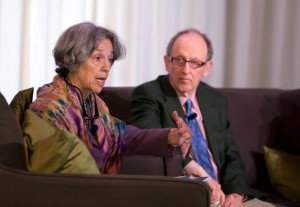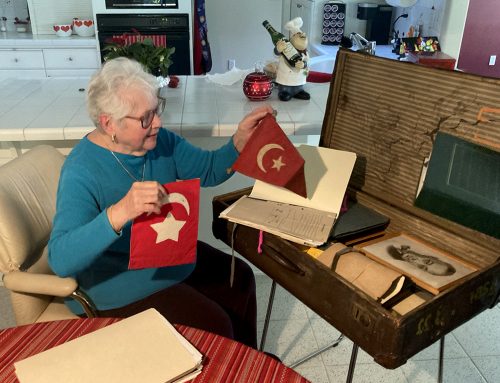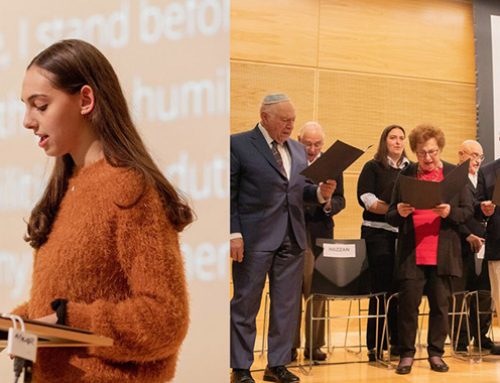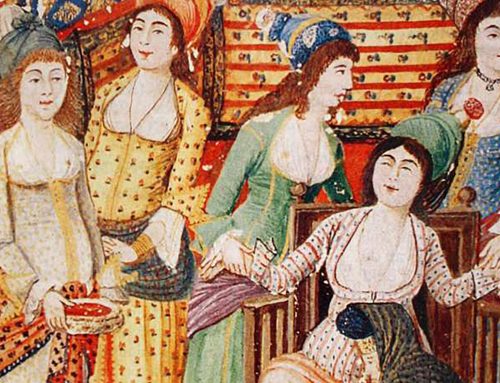 As part of an ongoing series of four conversations, the Stroum Jewish Studies Program brought together Ruth Messinger, the president of a leading American Jewish international aid organization and Professor Dan Chirot, a UW expert on global conflict.
As part of an ongoing series of four conversations, the Stroum Jewish Studies Program brought together Ruth Messinger, the president of a leading American Jewish international aid organization and Professor Dan Chirot, a UW expert on global conflict.
I thought the event was really interesting and what struck me most was that it was a conversation and not a traditional guest speaker role. I think this made the event more interesting because it didn’t seem so structured and also allowed for audience interaction.
During the event, Prof. Dan Chirot, who just returned from Kenya, spoke about his first time going to Africa and the work he did for international organizations like the United Nations and CARE. It was interesting because he mentioned that the situation in Africa has not changed from when he first visited nearly 4 decades ago.
“Like many people who worked in Africa in the 60’s or 70’s and went back,” he said. “I was shocked. The situation had gotten worse… the standard of living was lower and the infrastructure had broken down and was no longer working… it was very disillusioning to see that foreign aid wasn’t working.”

He did speak about the progress made in health and education but mentioned that the amount of aid has been very large yet hasn’t helped.
“Government aid often gets wasted, it becomes a resource,” said Chirot. “It corrupts the political process and having access to this aid becomes a way to sustain yourself, your family or your clan… and it can become a source of conflict.”
I thought this idea was really interesting because we always hear about the on-going ethnic wars, government corruption, and widespread famine and disease — which has certainly contributed to Africa’s situation. However, I had always thought of “more aid” as the solution rather than the problem.
Ruth Messinger, the president of the American Jewish World Service, a faith based international organization that aims to relieve hunger in the developing world spoke about the use of money for geopolitical reasons. That is, the idea that American gives money to different nations to maintain relationships.
“Sometimes we are giving aid money in response to the special interests in this country,” she said. “When we give aid to countries, we give it as loans and interests that’s being paid is more than the budget of those countries.”
I thought this was an interesting point because it is really clear that although we have spent a lot of money, the situation doesn’t seem to have changed.

Chirot also spoke about food aid and the criticism surrounding food aid because of the impact it has on the local agriculture.
“When there’s a donation of food, it’s given away cheaply and that hurts domestic farming because it reduces market share and all sorts of price inflations occur,” said Chirot. “A lot of famines occur because people can’t afford to get food.”
He then spoke about cash vouchers, which would support buying food locally instead of shipping food from America.
 Messinger spoke about the importance of finding the right leaders, agricultural sustainability and helping farmers learn drip-irrigation and other techniques as a way to provide long-term solutions instead of temporary food aid.
Messinger spoke about the importance of finding the right leaders, agricultural sustainability and helping farmers learn drip-irrigation and other techniques as a way to provide long-term solutions instead of temporary food aid.
It was really interesting to see the variety in the crowd, from older individuals to college students to rabbis and prominent scholars and community leaders.
It truly was a community event and it was really great that we all came together and learned about an important topic facing our world today.






Leave A Comment